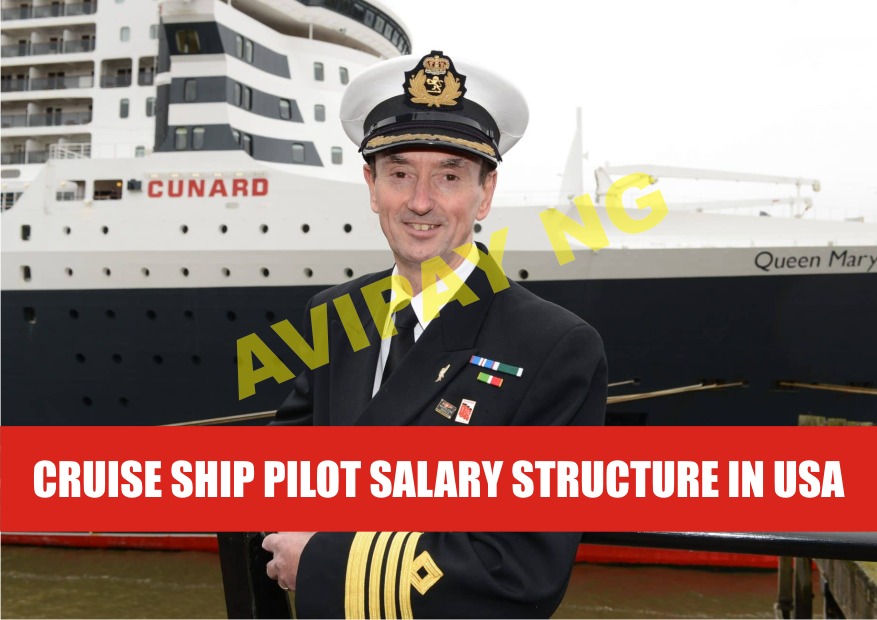Cruise Ship Captain Salary: Discover the facts about cruise ship captain salaries in the U.S., including average earnings, job responsibilities, benefits, and career progression.
Cruise ship captains hold one of the most respected and financially rewarding positions in the maritime industry. With their leadership, navigation expertise, and ability to manage a floating city, they earn salaries that reflect the critical nature of their role.
In this guide, we provide accurate, factual insights into cruise ship captain salaries in the United States. We’ll explore the factors influencing these salaries, job responsibilities, benefits, and how to pursue a career as a cruise ship captain.
Cruise Ship Captain Salary: By the Numbers
Cruise ship captain salaries in the United States are based on factors such as experience, ship size, and the cruise line. Reliable sources provide these statistics:
| Source | Salary Range | Average Annual Salary |
|---|---|---|
| Indeed.com | $48,000 – $150,000 | $88,730 |
| Comparably.com | $43,758 – $190,000 | $110,981 |
| CruiseCritic.com | $70,000 – $150,000 | ~$110,000 |
Key Factors Determining Cruise Ship Captain Salaries
1. Level of Experience
Experience significantly impacts a captain’s salary:
- Entry-Level Captains: Typically earn $48,000 to $70,000 annually.
- Mid-Level Captains: Earn between $88,000 and $120,000 per year.
- Senior Captains: Can earn up to $190,000 annually.
Experienced captains manage more complex operations, which leads to higher pay.
2. Size and Type of Vessel
The size and type of the ship captained play a significant role in determining pay. Larger ships, such as mega-liners or luxury vessels, generally pay captains more due to increased responsibilities and passenger volume.
3. Cruise Line
Major cruise lines such as Carnival, Royal Caribbean, and Norwegian Cruise Line offer competitive salaries and benefits. Smaller or less established companies may pay less, but they often provide opportunities for growth.
4. Education and Certifications
Captains with advanced degrees in maritime studies or certifications such as the Merchant Mariner Credential (MMC) and Transportation Worker Identification Credential (TWIC) earn higher salaries due to their specialized qualifications.
Responsibilities of a Cruise Ship Captain
The role of a cruise ship captain involves much more than steering the ship. Their responsibilities are vast and include:
Navigation and Safety
- Directing the ship’s course using advanced navigation systems.
- Ensuring compliance with international maritime safety regulations.
- Overseeing safety drills and emergency preparedness.
Crew and Operational Management
- Leading a crew that may exceed 1,000 members.
- Coordinating with department heads to maintain seamless operations.
- Ensuring adherence to maintenance schedules and operational standards.
Passenger Interaction
- Hosting welcome speeches and attending public events on board.
- Ensuring a positive guest experience by addressing passenger concerns.
Benefits Beyond Salary
Cruise ship captains receive various perks that add to the appeal of the profession:
- Bonuses: Many captains earn annual bonuses, averaging $12,000.
- Travel Opportunities: Captains travel to global destinations, experiencing diverse cultures.
- Onboard Accommodations: Captains are provided with private, fully furnished quarters.
- Comprehensive Insurance: Health, dental, and vision coverage are standard.
- Family Perks: Some cruise lines allow family members to accompany captains on select voyages.
How to Become a Cruise Ship Captain
A career as a cruise ship captain requires years of dedication, education, and training. Below is a step-by-step guide:
1. Education
Enroll in a maritime academy or pursue a bachelor’s degree in marine engineering, maritime science, or a related field.
2. Obtain Certifications
- Merchant Mariner Credential (MMC): Issued by the U.S. Coast Guard.
- Transportation Worker Identification Credential (TWIC): Ensures security clearance.
- Complete additional certifications as required by international maritime authorities.
3. Gain Maritime Experience
Start as a deckhand or officer and work your way up the ranks. Positions such as third mate, second mate, and chief officer provide the necessary experience for becoming a captain.
4. Develop Leadership Skills
Leadership is crucial for managing large crews and operations. Continuous training and experience enhance these skills.
Cruise Ship Captain Salary vs. Other Maritime Roles
| Maritime Role | Average Annual Salary |
|---|---|
| Cruise Ship Captain | $88,730 – $190,000 |
| Chief Officer | $60,000 – $100,000 |
| Second Officer | $40,000 – $70,000 |
| Deckhand | $20,000 – $40,000 |
These figures highlight the financial advantages of pursuing a captain’s role within the maritime sector.
Future of the Cruise Ship Captain Profession
According to the Bureau of Labor Statistics (BLS), employment in water transportation occupations is expected to grow by 2% over the next decade. The expansion of the cruise industry, particularly in luxury and mega-ship categories, promises sustained demand for skilled captains.
FAQs
What is the highest salary for a cruise ship captain in the U.S.?
Experienced captains commanding luxury or mega-ships can earn up to $190,000 annually.
How long does it take to become a cruise ship captain?
It typically takes 10-15 years, including education, certification, and work experience.
Do cruise ship captains receive bonuses?
Yes, bonuses are common, averaging $12,000 annually.
Are cruise ship captains provided with accommodation?
Yes, captains are given private accommodations onboard.
Is this a stable career?
Yes, the maritime industry offers stable and well-compensated career paths, especially for experienced professionals.
